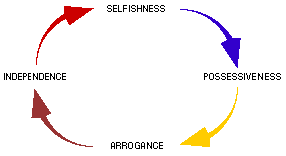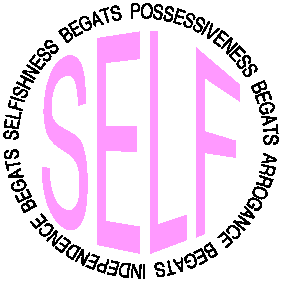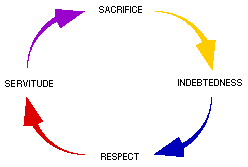In this article, I have used "Self" in what may seem to be the same context as the individual. That which makes you special to yourself is your Self. It does not mean that the Self is you. You can by choice change your Self while it is unlikely, even by choice, that you can change yourself. The Self I speak of is that part of you which you use to make decisions and choices. Your Self includes your desires, wishes, and dreams; your anger, hate, and love. All of which you can change by choice and all of for which you are accountable. And if you are like me, you may need to change some of the parts to your Self.
I am not practicing psychology, psychiatry, or any other mental health science. I am passing on to you a possible way to view human obsession: a way that does not pass on the blame to a bad childhood, abusive parents, or to some exaggerated trauma. I do not wish to offend or belittle anyone by this presentation, nor am I saying that anyone is a demon. I merely wish to offer a different way of looking at accountability.
Hear me, people! You will live forever. And where you will spend enternity is up to you and your God-given right to choose...your free will...you are accountable for where you will spend eternity. To spend eternity in heaven you must choose to accept believing that Christ Jesus died that you may be forgiven of your sins. If you do not, by not chosing you chose to spend eternity in hell!
Please, for your sake and for the sake of my Christian love for you, talk to a Pastor or other man of God about the mystery and simplicity of the saving grace of God. It is free! And it is simple! But you have to ask for His grace. You are accountable for your salvation...no one else can ask for you.
May you take wisdom from this different view of accountability and use that wisdom to defeat the demon whose name may be "Self."
In the sweet and holy name of Jesus:
Lord, Master, Teacher, Savior, God.
Amen.

The ChildCare Action Project (CAP) is a nonprofit Christian ministry. We rely on public support. If you wish to contribute to the CAP, please send your donations to


 It seems selfness candy is plentiful in the New World Order (NWO) movement and humanistic beliefs. Satan and his demons use selfness candy to sway an observer from practicing previously embraced Christian ethics, or to prevent an observer from ever coming to know the strength and peace in Christian ethics. Selfness candy can be seen in almost every media, especially the entertaiment media. All seem to provide poor examples of how one may obtain more satisfaction and self-gratification, sometimes at any cost, even to the extent of sadism and vengance. Selfness candy may appear in small and covert ways. Selfness candy may even be invisible: invisible to even the learned adult let alone the gullible, naive, innocent child, but are present nonetheless. And as long as selfness candy is present, it does its damage whether noticed or not.
It seems selfness candy is plentiful in the New World Order (NWO) movement and humanistic beliefs. Satan and his demons use selfness candy to sway an observer from practicing previously embraced Christian ethics, or to prevent an observer from ever coming to know the strength and peace in Christian ethics. Selfness candy can be seen in almost every media, especially the entertaiment media. All seem to provide poor examples of how one may obtain more satisfaction and self-gratification, sometimes at any cost, even to the extent of sadism and vengance. Selfness candy may appear in small and covert ways. Selfness candy may even be invisible: invisible to even the learned adult let alone the gullible, naive, innocent child, but are present nonetheless. And as long as selfness candy is present, it does its damage whether noticed or not.





